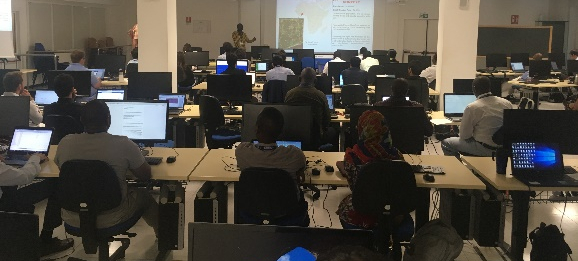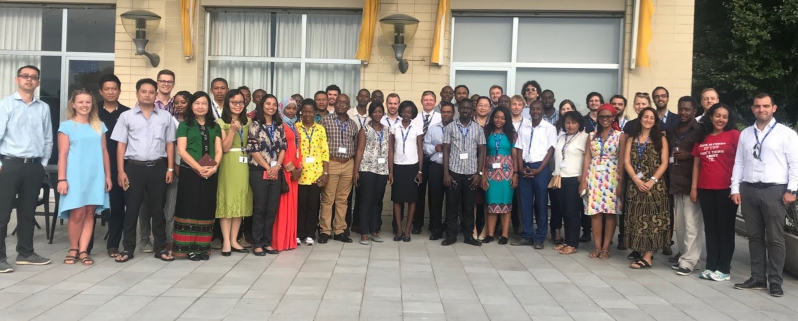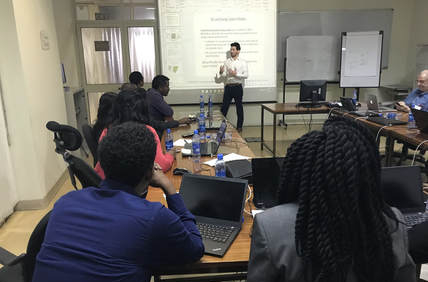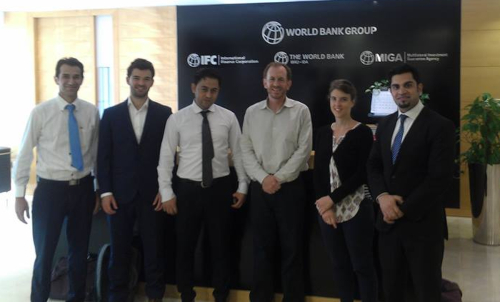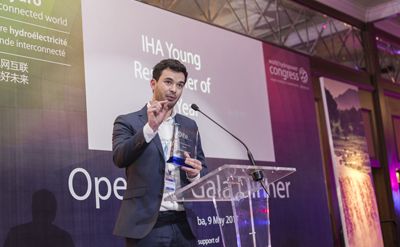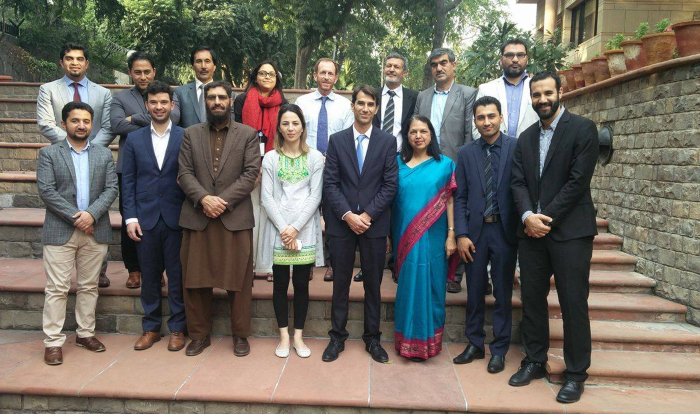About Me
Hi there! I ‘m Alex, an enthusiastic geospatial data analyst. My work mainly focuses on linking Geographic Information Systems (GIS) and energy systems models to support planning and policy development for rural electrification. Over the past years I have been working on enhancing key components of the OnSSET model as well as coordinating (or supporting) several projects with key partners such as the World Bank, UNDESA, IEA, UNECA, SNV and ABB.
I am highly motivated by the great potential of big data, remote sensing & data science in supporting solutions towards sustainable development. Thus, very interested in expanding my technical and analytical skills in these areas and dedicate my work on tackling complex problems of our world.
Expertise: Geospatial analysis, energy access, electrification planning, capacity building & knowledge transfer
Projects
The Global Electrification Platform (GEP) is a multi-phase project aiming at improving, standardizing, and simplifying the use of geospatial tools in least-cost electrification planning. It's front end is an open web platform for exploring electrification plans for all countries battling with energy access. Scenarios are based on the OnSSET model developed by KTH dESA. Both front and back end code of this project is open source, being designed upon the principles of transparency; it aspires to enable reusability, replicability and reproducibility of embedded processes and data.
Supporting the spatial, least-cost electrification analysis featuring IEA's special report on Energy Access Outlook for Africa. The analysis was based on a custom version of the OnSSET model accommodating the SDS and STEPS scenarios for 44 countries in SSA. The objective is to provide an in-depth analysis, quantitatively investigating today’s picture for access to modern energy, the strategies and technologies that can enable countries to achieve energy for all by 2030, and the ways in which reliable energy can move communities from poverty towards prosperity.
Developing a processing pipeline for integrating GIS data into the CLEWs model. The code collects, extracts and calculates key statistics on a defined unit level. Unit levels may be rasters (grid cells) or vector polygons (admin areas). The output is used as input in a typical CLEWs analysis.
The project employs a novel, modular and open source methodology to allow for delivery of multi-layered insights into estimated quantity and characteristics of electricity demand from agricultural activities (irrigation & post harvest processing) in Mozambique. The project is a collaboration between KTH dESA and Vivid Economics, and part of a multi-year WB ESMAP effort entitled “Geospatial Electrification Planning in the Africa Region”.
Developing a spatially-explicit model that determines, for two time steps (2025 and 2030), the electrification strategy that delivers electricity access at the lowest cost for several Geographical zones in Sub-Saharan Africa. The outcome is expected to feature IEA's Special Report on Africa (November 2019) as part of the World Energy Outlook (WEO) 2019 series. The objective is to provide an in-depth analysis, quantitatively investigating today’s picture for access to modern energy, the strategies and technologies that can enable countries to achieve energy for all by 2030, and the ways in which reliable energy can move communities from poverty towards prosperity.
Integrated geospatial electrification planning activity to assess potential electrification futures in Benin. The analysis was conducted using the OnSSET tool, utilising local data and involving key stakeholders from government, the private sector and academia. The final output includes a report in English and French and an open source code.
Integrated electrification planning activity in Madagascar as part of the World Bank LEAD project (P163870). The geospatial analysis was conducted using the OnSSET tool, utilising local data and involving key stakeholders from government and private sector. The final output includes a project report and an open source code.
Geospatial electrification analysis conducted for 44 countries in Sub-Saharan Africa as part of IEA'a special report on energy access, featuring WEO 2017. The project used best-in-breed analytics on geospatial electrification modelling and electricity demand projections and technology costs in alighnemnt with IEA's comprehensive modelling work.
This study explores the technological options and investment requirements needed to boost electricity access levels in Afghanistan and presents a method for performing a spatial based electrification analysis. As part of the World Bank’s wider effort to inform investments focused on increasing Afghans’ access to affordable and sustainable energy, the study offers an initial, “quick pass” at selected data to provide a sense of scale and to inform a more detailed analysis to be performed at a later date
This project uses geospatial data and OnSSET to determine the most cost-effective conventional and renewable energy technologies for bringing electricity to specific localities. It is designed to identify means of providing access to safe, affordable and reliable electricity to households that currently do not have it. The model compares options such as connections to the electrical grid, and mini-grid or stand-alone systems. It factors in population density, distance to transmission and road networks, renewable energy potential, fuel prices and estimated electricity consumption per household, among other considerations. Results of the model were vizualized in an interactive platform developed and operated by UNDESA.
Relevant Experience
OpTIMUS Summer School (Trieste Jun 2022)
World Bank, Climate Compatible Growth (CCG) Programme
Three-week online capacity building activity. Activities included preparation of training material, lecturing, coaching and debugging electrification models. Participants represented research institutions, government agencies and energy utilities from Uganda, Nigeria, India, Indonesia, Vanuatu, Kenya, Ghana.
EMPA 2021 (Mauritius Nov 2021)
Climate Compatible Growth (CCG) Programme
Two-week online capacity building activity. Activities included preparation of training material, lecturing, coaching and debugging electrification models. Participants represented research institutions, government agencies and energy utilities from Ethiopia, Malawi, Kenya, Eswatini, Zambia.
OpTIMUS Summer School (Trieste Jun 2019)
World Bank, DFID
Three-week capacity building activity. Activities included preparation of training material, lecturing, coaching and debugging electrification models. Participants represented research institutions, government agencies and energy utilities from Uganda, Afghanistan, Niger, Nigeria, Ghana, Burkina Faso, Kingdom of Eswatini and Uruguay.
OpTIMUS Summer School (Trieste Jun 2018)
World Bank, UNDP
Four-week capacity building activity. The workshop covered lectures and hands-on sessions on topics such as geospatial data collection and processing, and electrification modelling using the OnSSET tool. At the event participated 25 representatives from research institutions, government agencies and energy utilities from 11 countries (Mozambique, Togo, Ghana, Madagascar, Myanmar, Haiti, Malawi, Uganda, South Africa, Brasil and Italy).
Energy Modelling Platform for Africa (Addis Ababa Jan 2018)
UNECA - Climate Policy Centre (ACPC)
Supporting the organization and derivering one-week training on OnSSET. At the event participated over 30 trainees including government officials from across the continent, as well as academics and local UNECA analysts.
Capacity building (Dubai Jul 2017)
World Bank
Training workshop on OnSSET model. During the workshop, GIS experts from various Afghan institutions (AEIC, KUP, DABS, CRIDA, MRRD, AGCHO) were introduced to the OnSSET tool (OnSSET.org) and discussed along with Word Bank energy specialists upon the functionality and usability of the tool in their national energy access planning efforts.
World Hydropower Congress (Addis Ababa May 2017)
International Hydropower Association IHA
Presentation of initial findings on the technical assessment of small-scale hydropower (0.01-10 MW) in Sub-Saharan Africa using open-source geospatial datasets. Recieved the 2017 IHA Young Researcher Award of the Year.
Capacity building (New Delhi Feb 2017)
World Bank
Presentation of the National Electrification Plan, aiming to inform the Government of Afghanistan about which technology and investment options could be sought for relieable electrification of the country by 2030. During the workshop, GIS experts from various Afghan institutions (AEIC, KUP, DABS, CRIDA, MRRD, AGCHO) were introduced into the OnSSET model and discussed along with Word Bank energy specialists upon the functionality and usability of the tool in their national energy access planning efforts.
Academic Publications
A Little More About Me
Old school millenial that thrives in experiences, values equality and strives for - self and global - awareness. Always taking opportunities to expand skills and broaden mindset. I really enjoy meeting people that are passionate about their work and interests and want to make a difference. In my spare time I code, train and cook; I also like reading and discussing about history, political economy and geo-politics.
